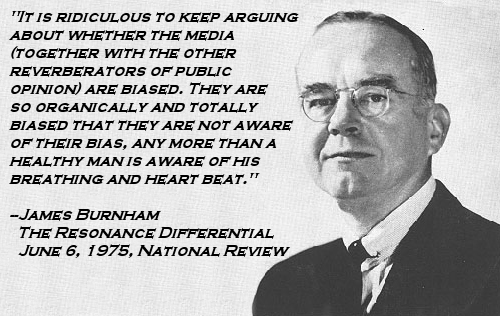The Resonance Differential
During a [Radio1975|1975 broadcast of Viewpoint with Ronald Reagan] called Ruritania, Reagan shares sections of this essay by Burnham.
Used with permission from National Review, 11/27/2018.
The Resonance Differential
The Protracted Conflict
JAMES BURNHAM
LET US suppose that a group of officers stages a successful coup and assumes control of the government in, well, let us call the nation Ruritania. They took this action, their spokesmen declare, because the old regime had fallen into the hands of Marxists, Communists, atheists, and criminal adventurers who were oppressing the population, wrecking the economy, endangering national security and independence, destroying law, order, and morality, and heading toward a Soviet-style totalitarian dictatorship.
Let us further suppose that after a year of rule by this military junta the situation in Ruritania is as follows:
- The junta has announced that it will continue to exercise the supreme power for "at least three to five" more years—and that its governing role will not be affected by the outcome of any elections that may be held.
- The Communist Party, Socialist Party, and other left-wing organizations have been outlawed.
- Leftist and liberal newspapers and magazines have been suppressed. Public expression of leftist and liberal opinion is forbidden. Attempted gatherings by leftists or liberals are broken up by left-wing militants.
- Several thousand citizens have been jailed without warrants or formal charges. None of these prisoners has been brought to trial.
- Many thousands of citizens have taken refuge in other countries.
- The rate of domestic inflation has risen to one of the highest levels in the world.
- Unemployment has tripled.
- A single union organization has been created, to which all workers are required to belong.
- Strikes have been defined as "economic sabotage" and "counterrevolutionary."
Assuming these as the features of the Ruritanian situation, let us now ask what sort of attitude and response there would be in other nations.
There would be thousands of meetings, conferences, demonstrations, speeches, editorials, columns, sermons, student sit-ins, petitions, pamphlets, and TV specials denouncing the Ruritanian fascist officers and their infamous violations of all human, civil, and political-rights. Eloquent addresses in the name of the suffering Ruritanian workers and peasants would thunder through UN halls. Open letters from writers, artists, professors, and clergymen would appeal to the conscience of mankind. Ad hoc committees would spring up in a dozen countries to demand sanctions against the fascist Ruritanian government, and severance of diplomatic relations. Economists would explain how Ruritania's economic disasters reconfirmed the decline of capitalism. Professorial chairs at the top universities would be offered Ruritanian escapees, and their lecture fees would triple. Amnesty International would condemn the mass torture of Ruritanian dissidents. Murray Kempton, Anthony Lewis, Garry Wills, Harriet Van Horne, and Tom Wicker would have a collective fit. A special issue of Time would give In Depth coverage of terror in Ruritania. Jack Anderson would reveal that CIA had financed the Ruritanian generals.
A Turn of the Prism
Given the Ruritanian situation as I sketched it, all this and plenty more would be as certain as the sun's rising.
It will doubtless have occurred to readers of this page that my Ruritania is not as purely fictional as the Ruritania known and loved by theater audiences. By making one small shift in the prism through which we are looking—interchanging, thereby, Left and Right—Ruritania is perceived to be, in every feature and detail I have enumerated, Portugal of the year just past.
With this prismatic shift to Portugal, however, the attitude and response in other nations is something else again. There hasn't, in fact, been much of any attitude or response since those ecstatic early weeks when all the world hailed the advent of the Carnation Revolution. I stress that I write here with entire sobriety and literalness. Except for a minor fringe sector, the global public opinion apparatus—media plus intellectuals, preachers, professors, college students, politicians, etc.—has not been upset about what has been going on in Portugal, or even interested: the same apparatus that worked itself into a frenzy over the regime of the Greek colonels, which had many similarities, though it was milder and considerably more successful in economic matters.
The Opinion Fulcrum
The public opinion apparatus is in a state of resonance to the emanations of an assault (real or alleged) from the Right on liberty, democracy, civil and human rights, standard of living, etc., but out of resonance to the emanations from an otherwise identical assault from the Left. Public opinion somehow can’t tune in the latter’s wave length. It is ridiculous to keep arguing about whether the media (together with the other reverberators of public opinion) are biased. They are so organically and totally biased that they are not aware of their bias, any more than a healthy man is aware of his breathing and heart beat.
There is one way of perceiving, feeling, judging, and responding to acts of the Left; another way, to the same acts sprung from the Right. But we may narrow the beam of our searchlight. It is not just the Left and Right as large, rather vague entities that determine the response. Closer examination shows that one small, simple factor is decisive: Does the regime suppress the Communist Party? If it does, then—whatever else its conduct and characteristics—it belongs with the Bad Guys and will in due course get the standard treatment from public opinion. And it will get the treatment cubed if it is at the same time friendly to the U.S.
Specifically: If the Portuguese military regime should tomorrow—it is not quite inconceivable—suppress the Portuguese Communist Party, then the day after tomorrow a global campaign, comparable in scale and ferocity to those mounted against the Greek colonels or now in operation against the Chilean military junta, would begin.
There is something of a mystery in these interrelationships. Perhaps, though, it is not as mysterious as we might prefer to find it.
